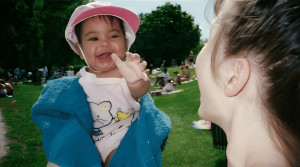In fact, when I first decided to write about my experiences with restrictive eating in my memoir, Unlike the Rest: A Doctor’s Story, I did so with incredible trepidation. Of course, there is the natural anxiety associated with unveiling intimate parts of yourself for public consumption and the fear around if – and how- it may impact future encounters with patients or career prospects. But one particular dynamic haunted my decision: my relationship with my mother.
My mom, Nmeka, first noticed the prominence of my collar bones and the unusual angularity of my facial features when she visited me at the McMaster University campus during my undergrad, gently questioning if I was okay. “Of course,” I offered her, secretly desperate for her to see through my façade, and recognize that her middle daughter was nearly forty pounds lighter than she had been only a couple of months prior.
I couldn’t admit to my mother, no less to myself, that I was struggling – really struggling – with disordered eating. My life was in a tailspin after a turbulent end to a toxic relationship in the middle of the hardest academic year of my undergraduate degree, and the only perceived control I had was over what I ate – or didn’t. Subsequently, I became numb to the needs of my body and focused 100% of my energy on my studies – spending exhaustive hours in the library studying until my eyes stung with fatigue and my stomach cried out in hunger. My goal was to ace the year, no matter what personal obstacles were in my way, and at any cost.
I barely ate anything at all for weeks on end, leaving my body as collateral damage. I would subsist on half-eaten apples and scarcely buttered toast, drowning out the wails of my belly with my own muffled sobbing at night. When the extent of the wreckage declared itself and my wilting body washed ashore, I barely had the strength to pick up the pieces of my life or confront my mother with the truth.
I knew she would struggle to understand how she had fled rural Nigeria and a childhood ravaged by state-sanctioned starvation throughout the Biafran war, to come to a land of abundance and have a daughter choose to starve herself. She and my father had carefully peppered my childhood with stories of the atrocities of the Biafran war, which involved the genocide of my ancestral people, the Igbo tribe, in the late 1960s. My siblings and I had a somber understanding of the death and devastation they endured and the brutal hunger that marred their childhood and claimed the lives of family members I would never have a chance to meet.
Yet, there I was, deciding to inherit a part of their lives they hoped to leave behind when they boarded a plane for Canada in the 1980s. I subsequently carried an immense shame that burrowed within me for years, and the inability to look my mother in the eyes knowing she would be staring into a past that terrified her.
So, despite many attempts at trying to write about my experiences with disordered eating, even after I had physically recovered and brought my mental health back to calm waters, I still couldn’t. Many poems would be started and abandoned, and many conversations with my mom about any mental health concern followed the same trajectory.
Mentors cautioned me never to reveal any vulnerabilities in professional or even creative spaces related to my mental health, as it could be used against me. I also understood I didn’t fit the traditional archetype of what an eating disorder could look like, as popular culture has often depicted a version of fair-skinned teenage girls aspiring towards thinness. Not a twenty-something Black girl who simply wanted control in the upheaval of her life. The fallout of this resulted in me holding in the pain of the experience in isolation, almost like holding my breath while drowning.
When I went through medical school, as the only Black student in my class, slipping into old, comforting, and dangerous patterns of stress regulation through food restriction, I was once again forced to reckon with my body.
This time, the path back to mental and physical health was much more arduous and destabilized further by the precarious situation of navigating an illustrious medical institution while being painfully unlike the rest. In the process of trying to “prove” I was worthy of belonging, I lost the connection to my body once more. The shame I felt expanded over time, filling in all the spaces starvation had carved out.
When I was approached with the opportunity to write a memoir about my experiences as a Black woman in medicine, I finally felt I was ready to bring light to the shame that nearly suffocated me. It was, in essence, easier for me to write about my experiences than it was for me to confront those around me with the truth.
{https://www.youtube.com/watch?v=Hji9HwkRueM&t=1s}
I could finally exhale after years of struggling in silence, because giving oxygen to the things that brought me shame allowed me to breathe more easily.
Writing this now, it has been over seven years since my last bout of disordered eating, and with time, grace, lots and lots of therapy, and carrying two beautiful babies in miraculous pregnancies, I can confidently say that my body has found her way back to me.
Unexpectedly, something else occurred – my mother and I were finally able to discuss my experiences with disordered eating without the shame and guilt that hung over our conversations like a dark cloud. She saw me for the fullness of my personhood, and it liberated her to also share the parts of her upbringing that she hid away in shame and fear of othering.
Maybe, just maybe, we are entering an era where our bodies will be protected, and our voices will shake the antiquated foundations that once made us crumble.
I hope the world my daughter inherits will teach her that her body is worthy, just because. And, if for whatever reason, society falters or she questions the inherent beauty and worthiness of her body, I am quieted in knowing that I’ll always be the softest place for her to land.

 By
By 





